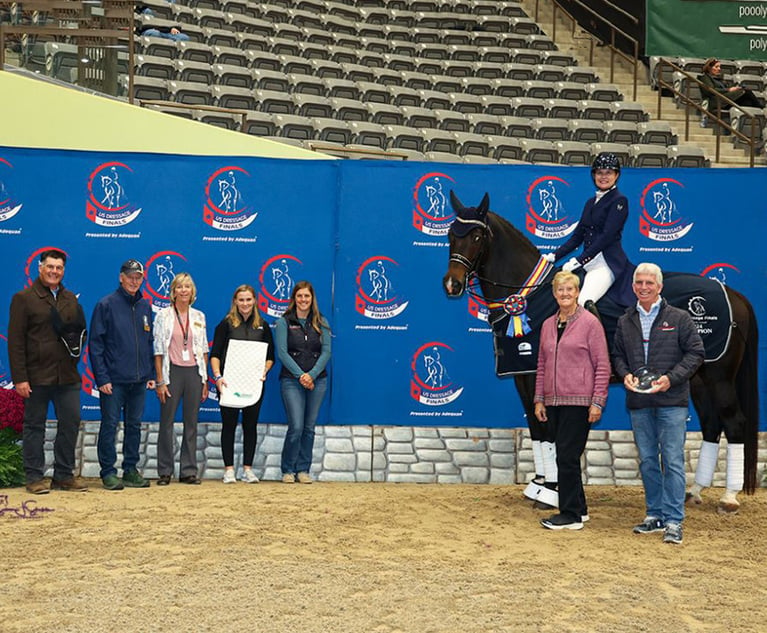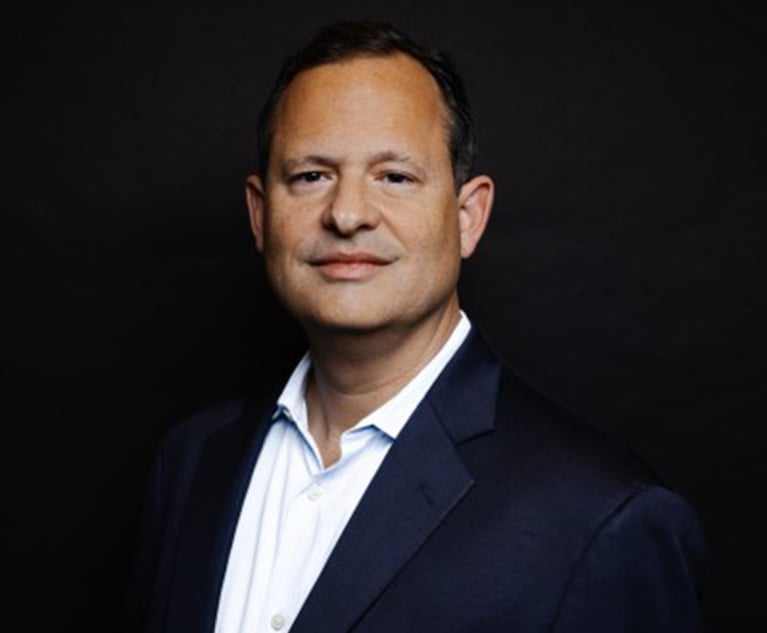 Kalpana Kotagal, a partner with Cohen Milstein Sellers & Toll. Courtesy photo
Kalpana Kotagal, a partner with Cohen Milstein Sellers & Toll. Courtesy photoQ&A: Cohen Milstein's Kalpana Kotagal on Fighting Discrimination
"We need to think about some of the coercive mechanisms like forced arbitration that keep workers from vindicating their rights," Kotagal says.
February 22, 2019 at 03:45 PM
4 minute read
The original version of this story was published on National Law Journal
A year ago the actress Frances McDormand, accepting an Oscar at the Academy Awards, pushed her fellow stars to learn about the so-called inclusion rider as part of a drive to boost diversity across the film industry.
That moment was surreal for Kalpana Kotagal, the Cohen, Milstein, Sellers & Toll partner who helped write the language for such provisions. The rider is essentially a contract that influencers in Hollywood can use to require studios and other partners to employ diverse workers on set.
The idea sprung from the Media, Diversity and Social Change Initiative at the University of Southern California's Annenberg School for Communication and Journalism. The initiative was founded and directed by professor Stacy Smith. Kotagal connected with Smith through Anita Hill, who is of counsel at Cohen Milstein.
We spoke with Kotagal about inclusion riders, how corporations are reckoning with the new focus on harassment, and what's next. The conversation that follows was edited for length and clarity.
NLJ: What's the background on the inclusion rider?
Kotagal: Actors use their clout in the industry to push for change in any given project. I had previous done some thinking about the Rooney Rule and its inspiration and where it's fallen short. The Rooney Rule [inspired by the National Football League] just requires an employer to bring in a nonwhite candidate into the process. It doesn't ask for consideration for hiring. We wanted to think about influencing roles behind the camera, as well as on screen. I helped write the legal language. We met with a lot of talented lawyers and agents. We were working through this language through the industry. We refined and refined. Eventually we were really working to get people to adopt it. In that time period Frances McDormand heard from her agent. Then, bam, she won the Oscar and we were totally surprised. What Frances did by supercharging it created this space for the A-listers and talent to say, “We are committed.”
How does the inclusion rider work?
Candidates from historically underrepresented backgrounds are explicitly included in the auditioning and interviewing process, and we have a provision in there that requires auditions to be held in places that are accessible for those with limitations. The next part goes further and sets to encourage to hire and cast highly qualified folks. It could happen at a variety of different stages, including early in the production process.
How could Hollywood's diversity efforts affect other industries?
The legal profession is an example. Hollywood's certainly not alone. We all have to do better on the hiring front. I would also say that it's important as we think about what are the preconditions for real equality of opportunity that go past hiring. We need to be challenged to think about pay equity and the evaluation process and access to assignments and how we think of accommodations and leave for caregiving. We need to think about some of the coercive mechanisms like forced arbitration that keep workers from vindicating their rights, as well as wage theft and other systemic issues that disproportionately affect low-paid workers. The hiring piece of this is great but not sufficient.
The #TimesUp movement sparked a conversation about diversity and equality in Hollywood, as well as the corporate world. How do you see that conversation continuing?
I think a constant focus and renewed focus is an important part of what comes next. In my practice we are continuing to look for the kinds of problems that give rise to systemic discrimination. There are more subtle issues, such as pregnancy discrimination, than the #MeToo movement. These issues underscore how power and balance in workplaces can lead to what are systemic problems.
This content has been archived. It is available through our partners, LexisNexis® and Bloomberg Law.
To view this content, please continue to their sites.
Not a Lexis Subscriber?
Subscribe Now
Not a Bloomberg Law Subscriber?
Subscribe Now
NOT FOR REPRINT
© 2024 ALM Global, LLC, All Rights Reserved. Request academic re-use from www.copyright.com. All other uses, submit a request to [email protected]. For more information visit Asset & Logo Licensing.
You Might Like
View All
'New Circumstances': Winston & Strawn Seek Expedited Relief in NASCAR Antitrust Lawsuit
3 minute read
'It Refreshes Me': King & Spalding Privacy Leader Doubles as Equestrian Champ
5 minute read
Federal Judge Rejects Teams' Challenge to NASCAR's 'Anticompetitive Terms' in Agreement

As Uncertainty Hovers Over PGA Merger, LIV Golf Hires Entertainment Industry Veteran as Legal Chief
Trending Stories
- 1'That Decision was Wrong:' Federal Judge Rethinks Consumer Protection Class Certification
- 2Bar Report — Dec. 2, 2024
- 3The Impact of Erlinger on Predicate Felony Sentencing Statutes
- 4To Ease Partner Pay Tensions, Some Law Firms Are Seeking 'Middle Ground' in Transparency
- 5How Legal Aid and Tech Collaboration Can Bridge the Justice Gap
Who Got The Work
Michael G. Bongiorno, Andrew Scott Dulberg and Elizabeth E. Driscoll from Wilmer Cutler Pickering Hale and Dorr have stepped in to represent Symbotic Inc., an A.I.-enabled technology platform that focuses on increasing supply chain efficiency, and other defendants in a pending shareholder derivative lawsuit. The case, filed Oct. 2 in Massachusetts District Court by the Brown Law Firm on behalf of Stephen Austen, accuses certain officers and directors of misleading investors in regard to Symbotic's potential for margin growth by failing to disclose that the company was not equipped to timely deploy its systems or manage expenses through project delays. The case, assigned to U.S. District Judge Nathaniel M. Gorton, is 1:24-cv-12522, Austen v. Cohen et al.
Who Got The Work
Edmund Polubinski and Marie Killmond of Davis Polk & Wardwell have entered appearances for data platform software development company MongoDB and other defendants in a pending shareholder derivative lawsuit. The action, filed Oct. 7 in New York Southern District Court by the Brown Law Firm, accuses the company's directors and/or officers of falsely expressing confidence in the company’s restructuring of its sales incentive plan and downplaying the severity of decreases in its upfront commitments. The case is 1:24-cv-07594, Roy v. Ittycheria et al.
Who Got The Work
Amy O. Bruchs and Kurt F. Ellison of Michael Best & Friedrich have entered appearances for Epic Systems Corp. in a pending employment discrimination lawsuit. The suit was filed Sept. 7 in Wisconsin Western District Court by Levine Eisberner LLC and Siri & Glimstad on behalf of a project manager who claims that he was wrongfully terminated after applying for a religious exemption to the defendant's COVID-19 vaccine mandate. The case, assigned to U.S. Magistrate Judge Anita Marie Boor, is 3:24-cv-00630, Secker, Nathan v. Epic Systems Corporation.
Who Got The Work
David X. Sullivan, Thomas J. Finn and Gregory A. Hall from McCarter & English have entered appearances for Sunrun Installation Services in a pending civil rights lawsuit. The complaint was filed Sept. 4 in Connecticut District Court by attorney Robert M. Berke on behalf of former employee George Edward Steins, who was arrested and charged with employing an unregistered home improvement salesperson. The complaint alleges that had Sunrun informed the Connecticut Department of Consumer Protection that the plaintiff's employment had ended in 2017 and that he no longer held Sunrun's home improvement contractor license, he would not have been hit with charges, which were dismissed in May 2024. The case, assigned to U.S. District Judge Jeffrey A. Meyer, is 3:24-cv-01423, Steins v. Sunrun, Inc. et al.
Who Got The Work
Greenberg Traurig shareholder Joshua L. Raskin has entered an appearance for boohoo.com UK Ltd. in a pending patent infringement lawsuit. The suit, filed Sept. 3 in Texas Eastern District Court by Rozier Hardt McDonough on behalf of Alto Dynamics, asserts five patents related to an online shopping platform. The case, assigned to U.S. District Judge Rodney Gilstrap, is 2:24-cv-00719, Alto Dynamics, LLC v. boohoo.com UK Limited.
Featured Firms
Law Offices of Gary Martin Hays & Associates, P.C.
(470) 294-1674
Law Offices of Mark E. Salomone
(857) 444-6468
Smith & Hassler
(713) 739-1250








